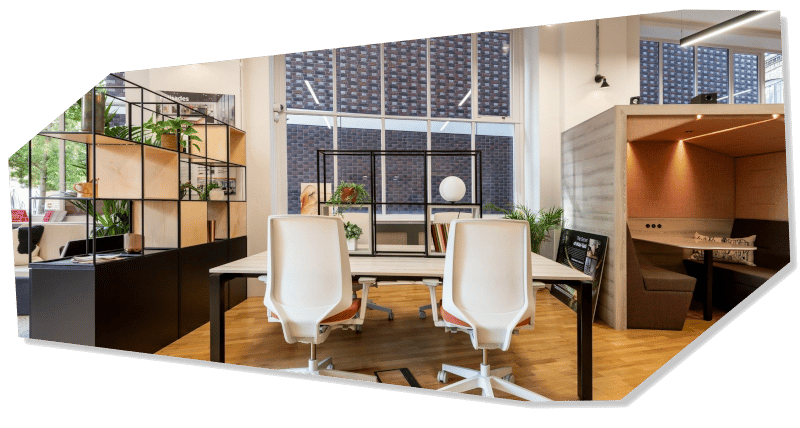Why develop a coworking space?
Before entering the market as a coworking space provider, you need to be clear on how the business model is going to work for you, as well as how you’re going to provide value to your target audience. Only by putting yourself in the mind of your potential clients will you be able to build an offering with enduring commercial appeal. Here, we break down some of the key considerations, both from your perspective as a coworking provider, and from the point of view of the businesses and individuals you hope to attract to your space.
Benefits for providers
Coworking spaces provide flexible workspace solutions for businesses and individuals that need them, whether they are moving into new geographies, undergoing periods of change or growth, or moving away from traditional ways of working. As such, they can be highly sought-after spaces with the potential to bring in a great deal of profit and future expansion opportunities.
Profitability
The demand for coworking spaces is set to rise each year as companies realise the benefits of flexibility, innovation and collaboration they provide. Clients are prepared to pay a premium for short-term, flexible space that may for them be more cost-effective than having to renegotiate a lease or move offices to a larger floorplate. Successful coworking providers that meet these demands can become highly profitable if they get the formula right.
Capture emerging markets
Now is the optimal time to start developing your coworking space, as attitudes towards the traditional office continue to shift. With record numbers of businesses now looking for flexible office options, you’ll have the opportunity to capture these emerging clients before they sign new leases or make deals with other coworking providers.
Potential for growth
Any company looks for growth in determining their project’s potential. The idea of coworking spaces alone is full of opportunities for expansion. A successful coworking space will be able to continuously evolve as you re-invest profits, grow your portfolio and capture new clients.
Resilience of concept
While the impact of the pandemic devastated many UK businesses, the flexible office industry saw a growth rate of 4%. This demonstrates the concept’s endurance despite the hardships faced across other industries, and its unique ability to thrive in times of upheaval and change, by helping businesses to do the same.
Benefits for users
As with any business venture, considering the drivers, goals and pain points of your intended client base is essential to enable you to optimise the experience of the end user. When developing your coworking space, understanding what your intended users will want to achieve in utilising it will enable you to include all the appropriate elements and features that will drive demand for and use of the space.
Improved people performance
Over the course of the pandemic many businesses moved to remote or hybrid working, with some going so far as to give up large amounts of their office space permanently. Although working from home brings benefits to businesses and workers, many have also experienced isolation and diminishing levels of productivity over time. This has put a renewed focus on the importance of connection and collaboration in person, with 85% of people stating they preferred a ‘hybrid’ approach to purely home or office working. Coworking spaces are ideally placed to provide this combination of connection and flexibility.
Rationalised business costs
Right now, with the benefits of flexible and hybrid working are in the spotlight, many businesses are looking at functional alternatives to their expensive fixed office spaces. Many are using coworking spaces to provide stimulating environments for staff, without the additional overheads involved in leasing and running a large floorplate.
Space optimisation
Coworking spaces offer business owners the potential to optimise the office space they do keep. In a way, their coworking memberships are like ‘outsourcing’ workspaces that their employees can make the most of elsewhere. The remaining space saved at the office can be used for more industry-based pursuits, innovative technology, repurposed for a profit or handed back to the landlord.
Engaged workforces
Those operating within any coworking space will recognise the level of engagement found amongst workers. The power of networking in these spaces is a key part of their attraction, enabling teams and individuals to engage with others in related fields, creative opportunities to collaborate and innovate, as well as providing a potential source of talent for in-house recruiters. Working within carefully designed spaces that cater to like-minded people can also offer a boost in creativity.
Shared amenities
Small-scale start-ups and individuals benefit from the high-end shared amenities offered within coworking spaces. These groups can make the most of shared kitchens, bathrooms, activity areas, and tech included within their coworking membership, avoiding the large set-up costs required to provide such facilities.
Implemented well, the benefits of coworking spaces for both users and providers soon stack up. The key to getting it right is in planning the details of your space to maximise its effectiveness and profitability, and to avoid any of the common pitfalls. In our next blog, we’ll be looking in more detail at how to do this.
Office workspace can help you create an innovative coworking environment
At Office Workspace, we’re experts in developing modern office spaces that enhance productivity, creativity and collaboration while reducing costs.
As a multi-generational, family-owned business, we’ve refined our methodology over the years to provide our clients with best-in-class solutions, services and support. As attitudes to the workplace evolve, so do we, and this is reflected in our approach to the workspace. Fusing data-led practicality with our unwavering creative vision, our coworking developments are designed for success.
If you’d like to discuss how our coworking space solutions could work for you, please call our team on 020 8309 0000. Alternatively, you can get in touch via our online contact form.

